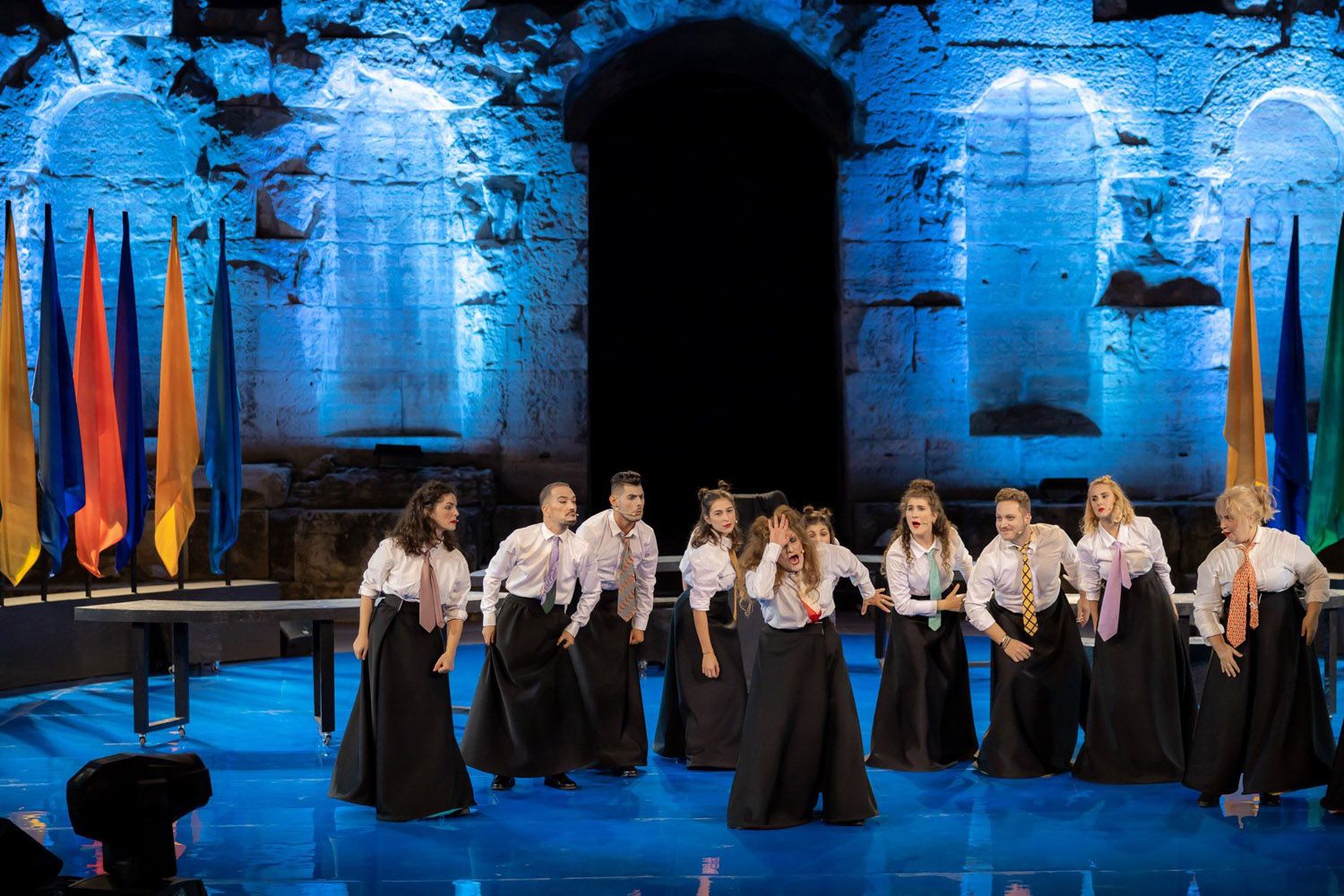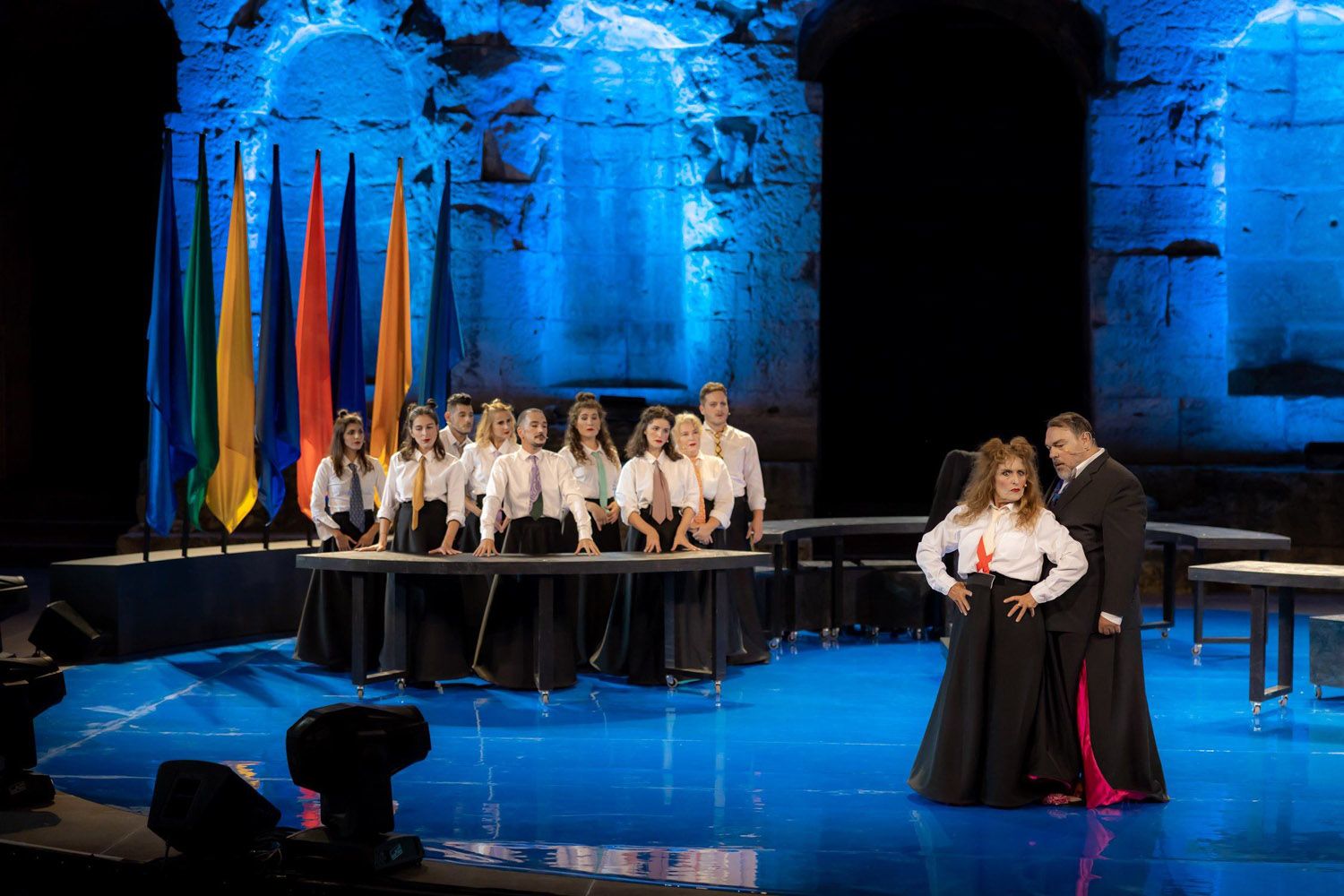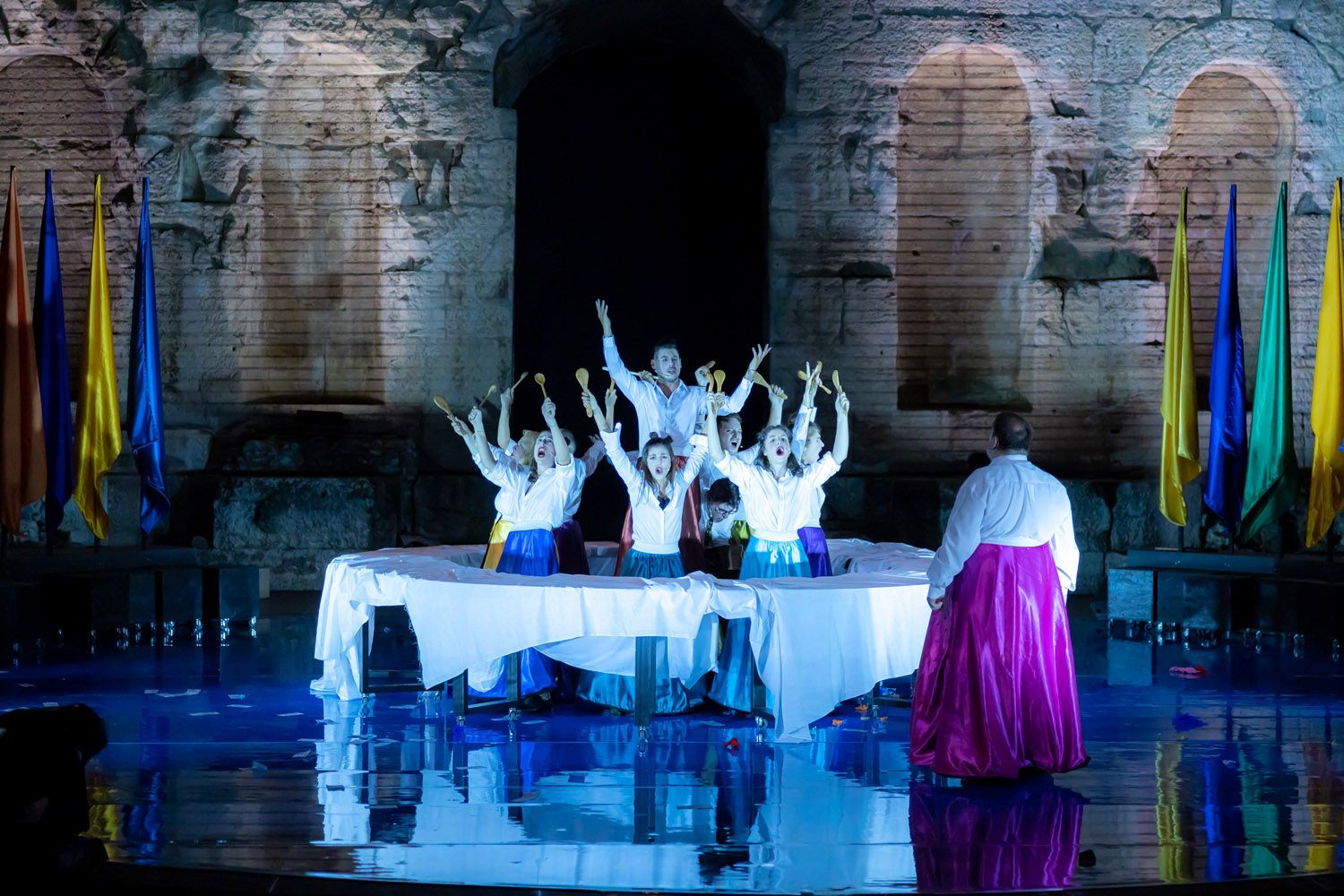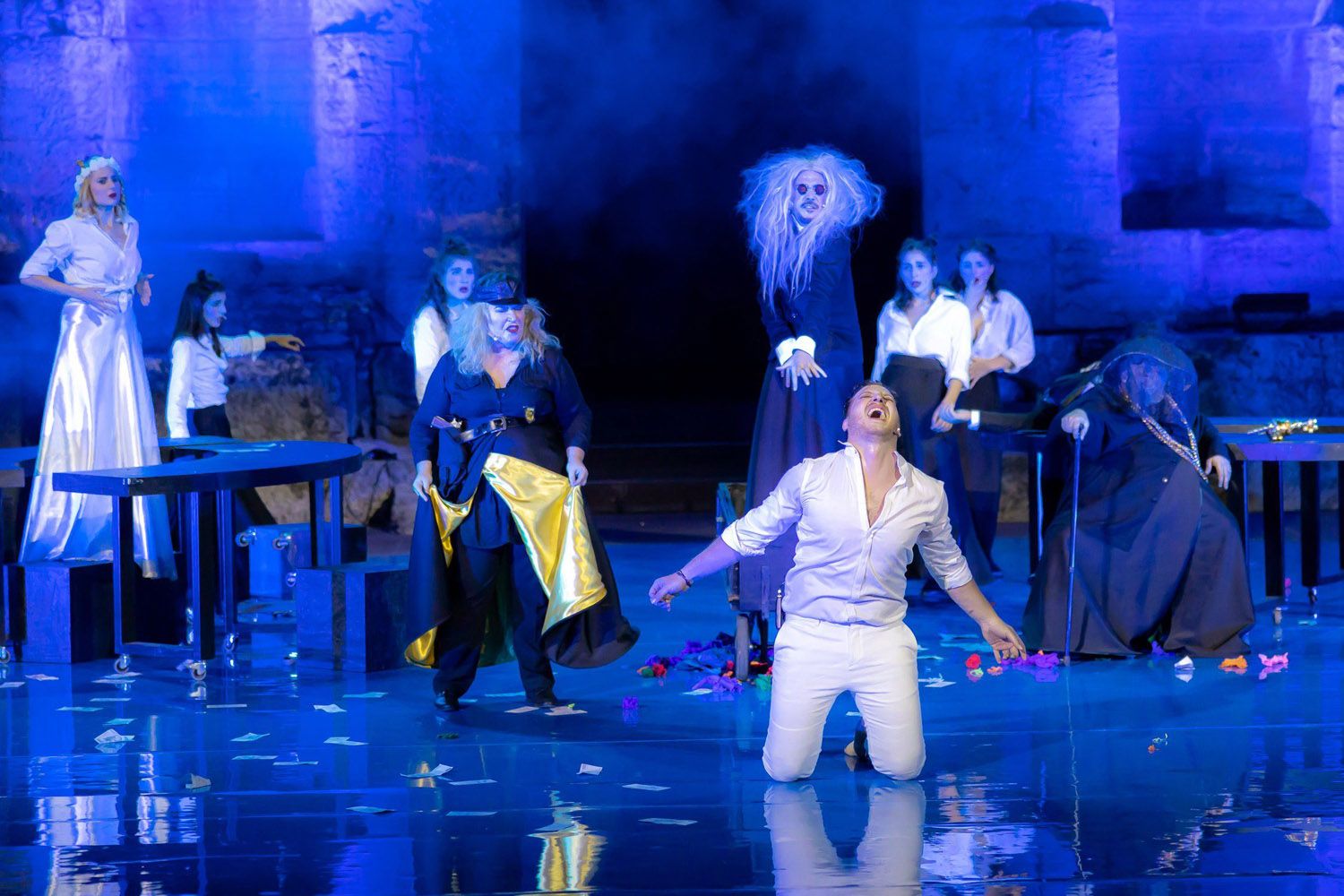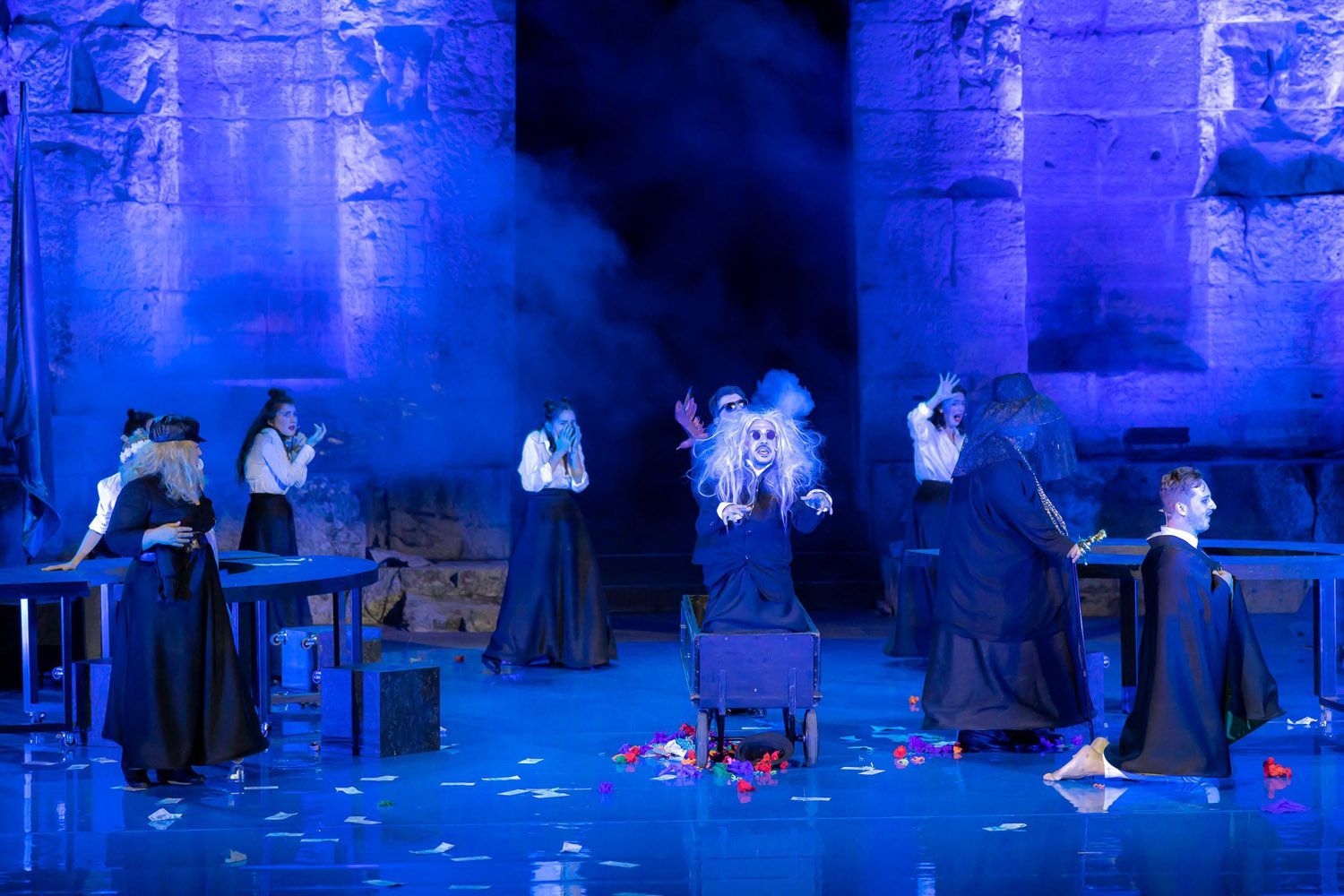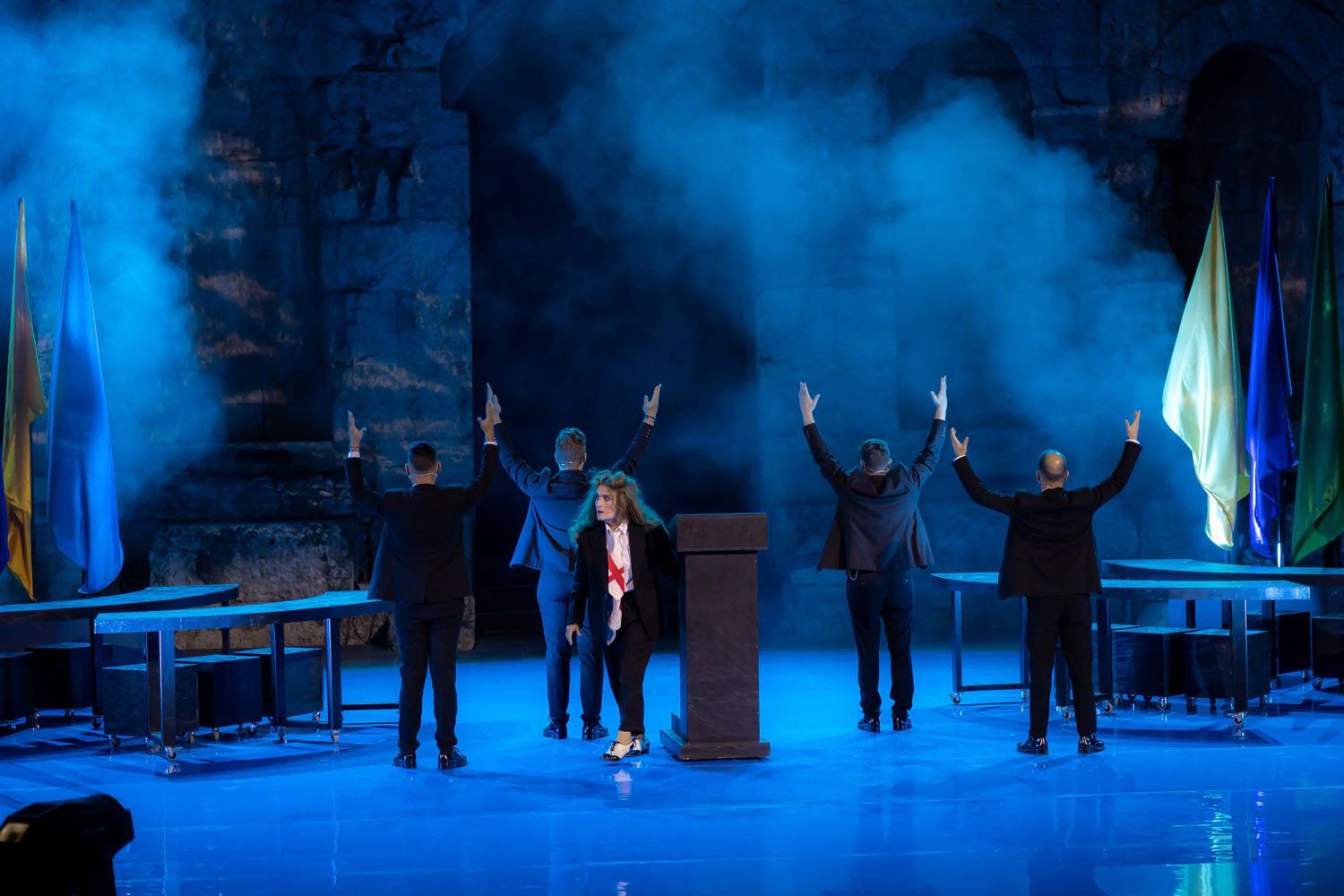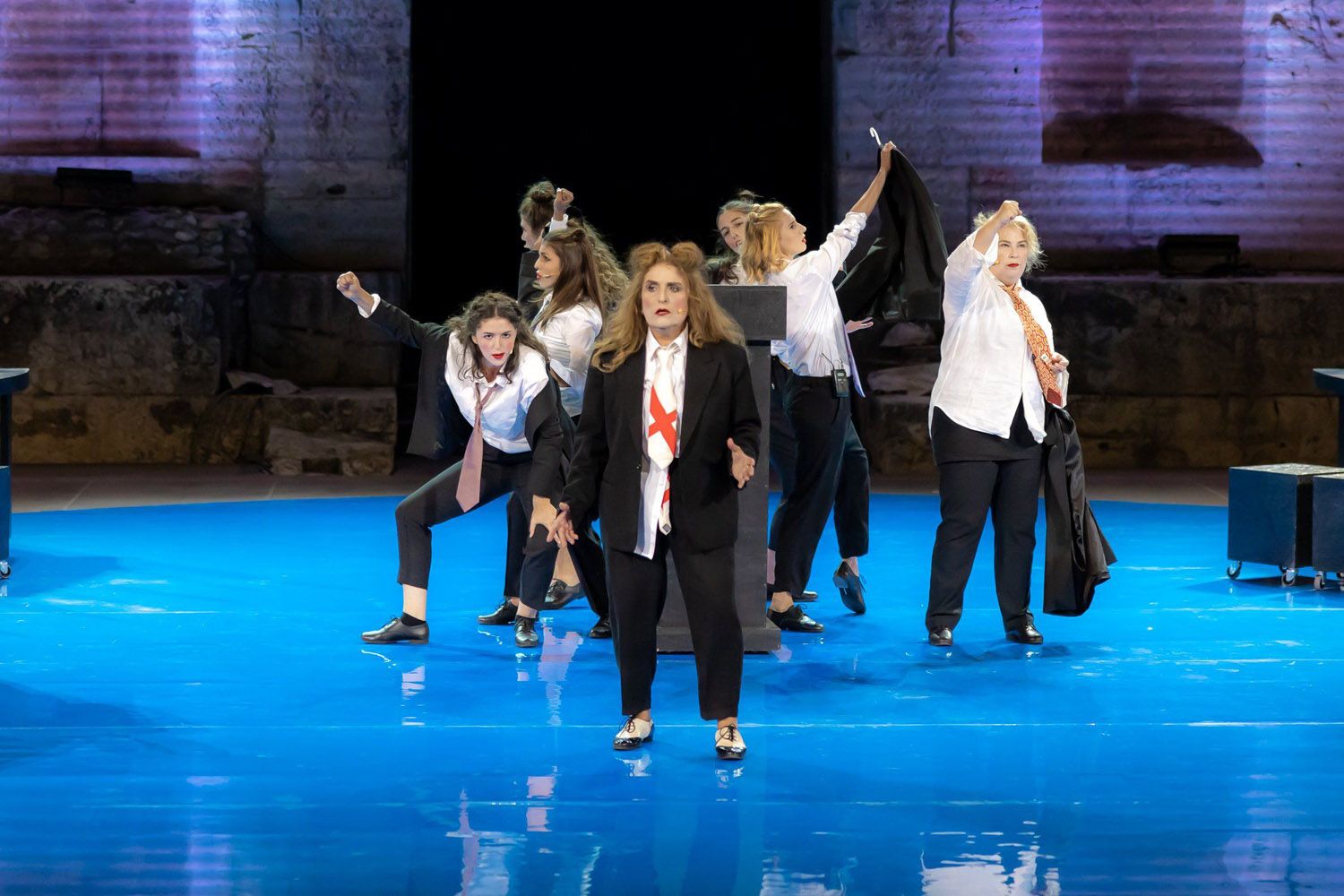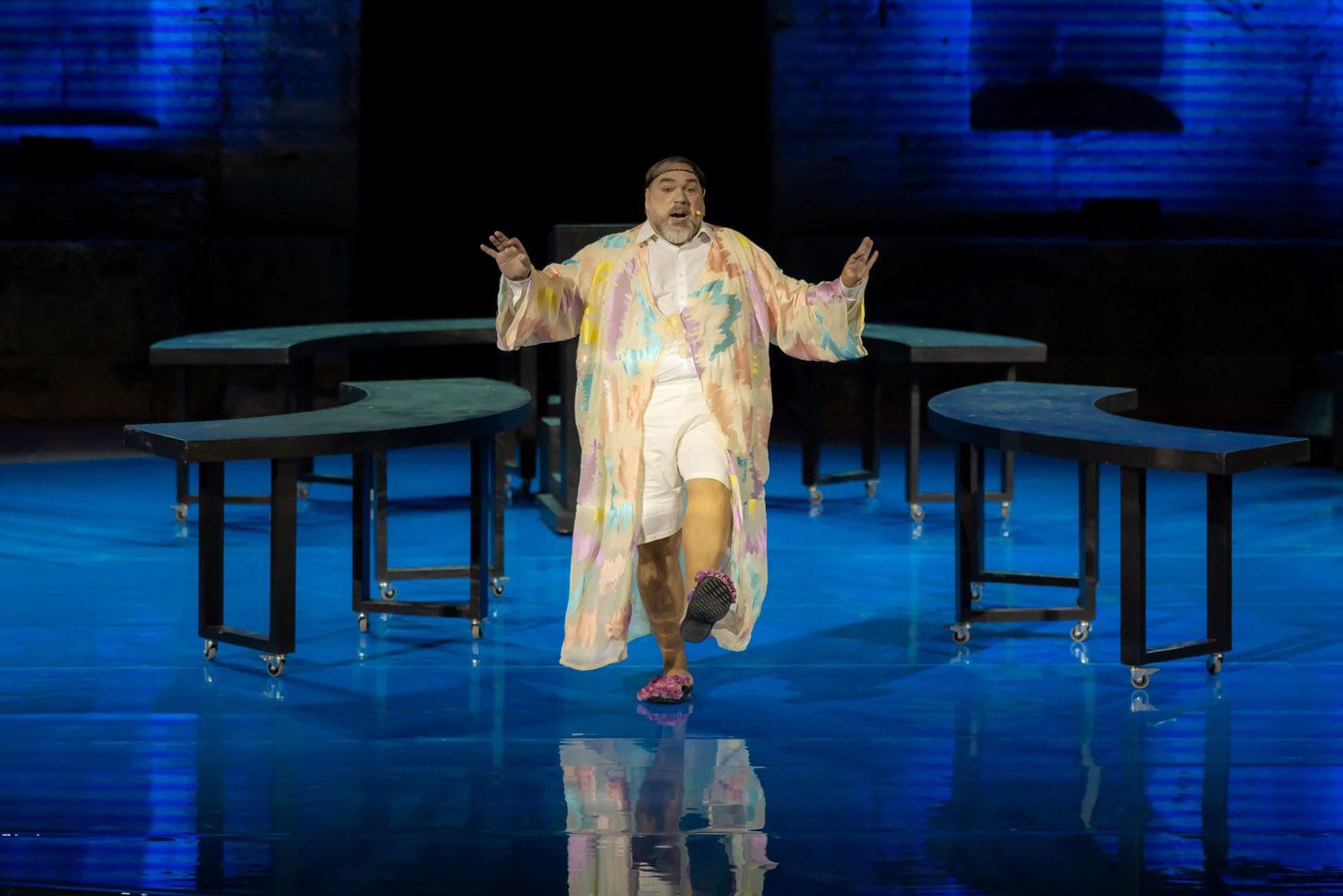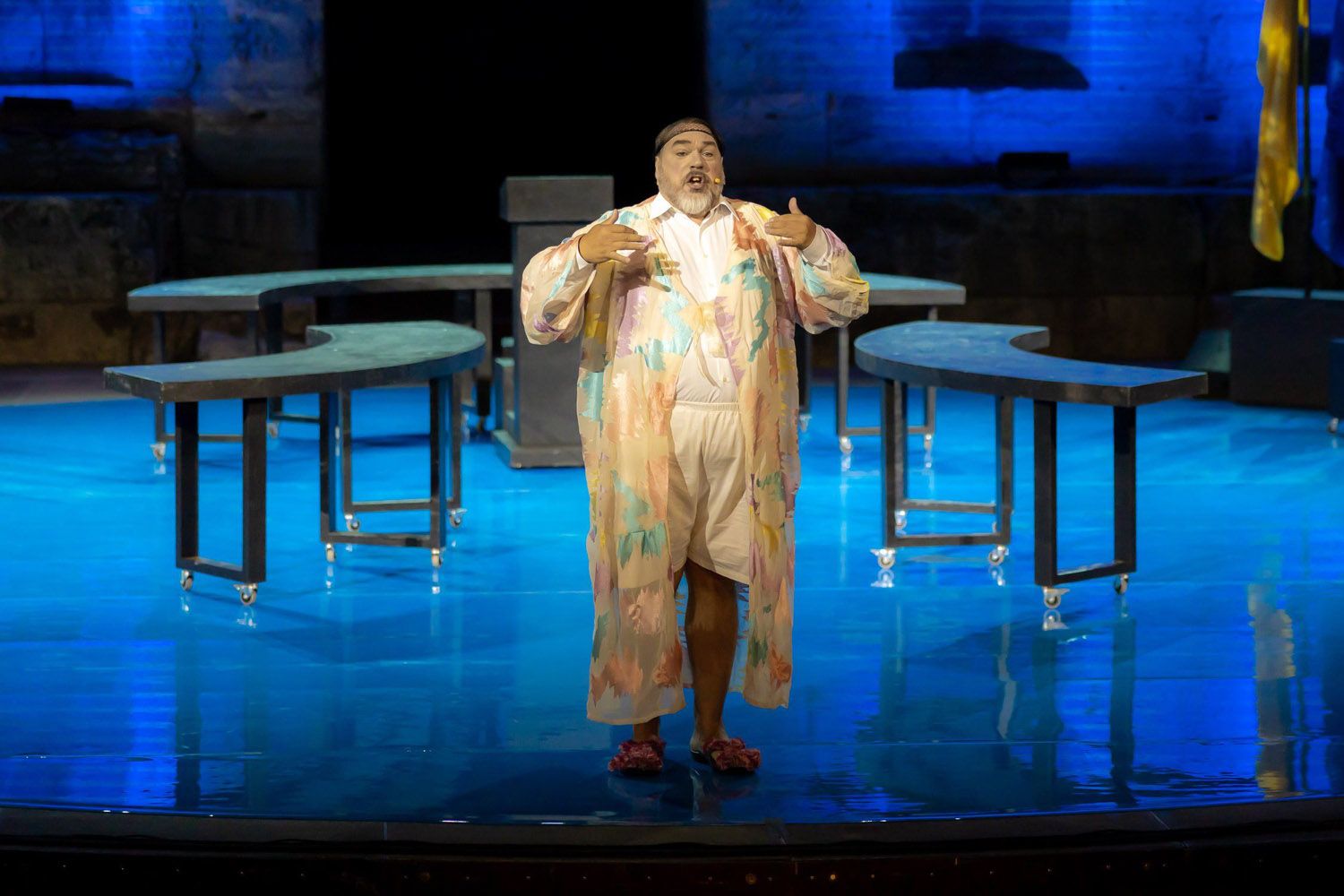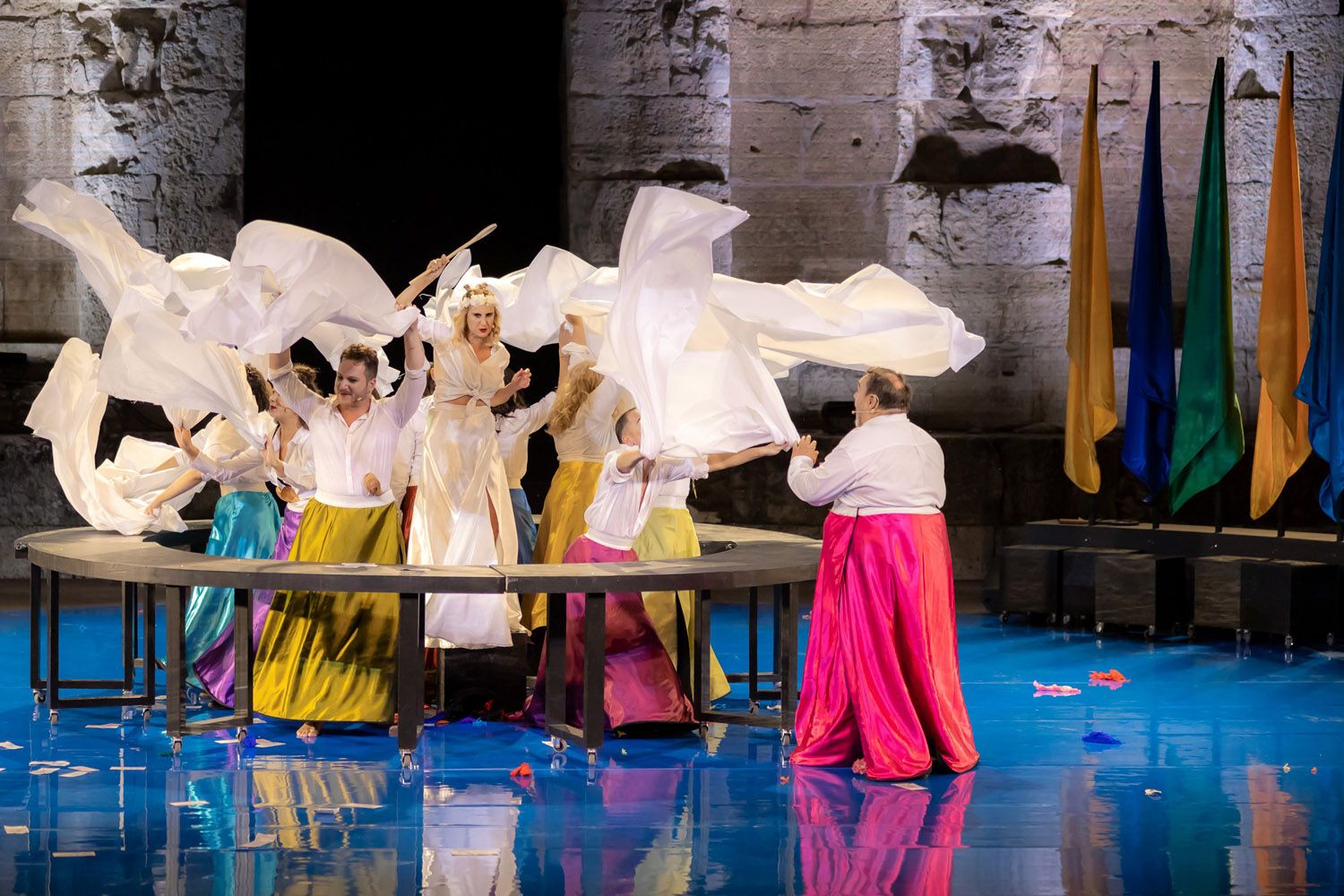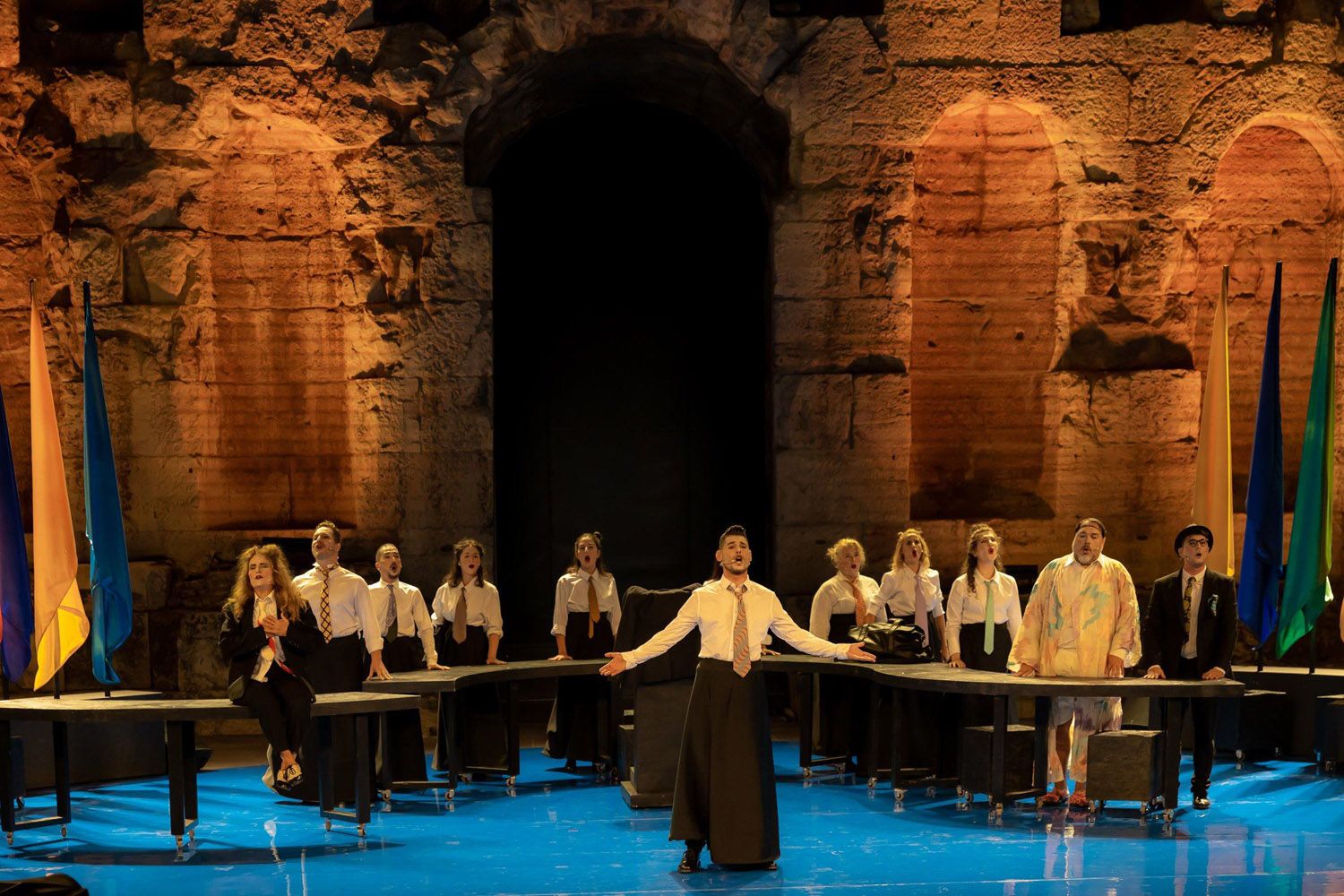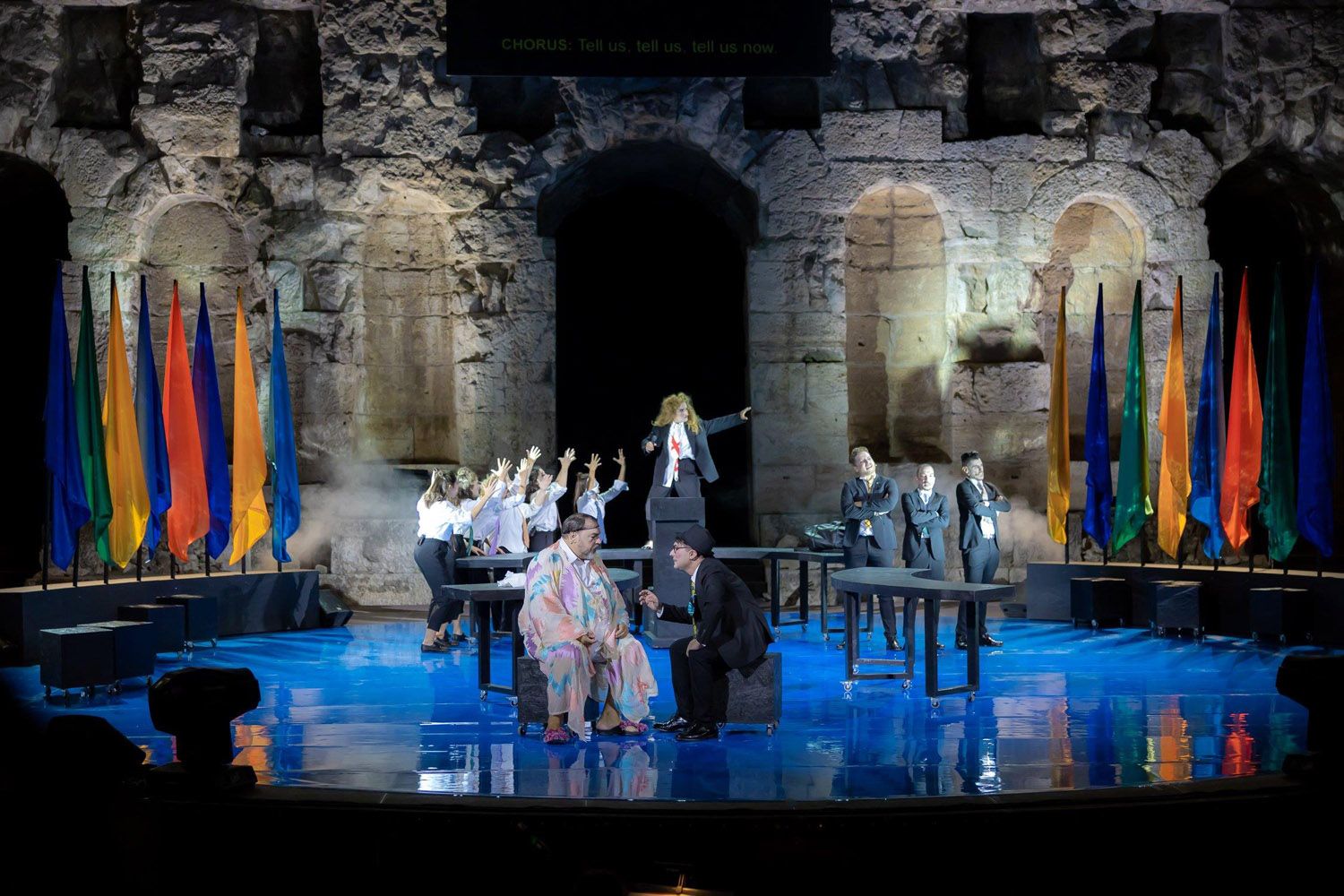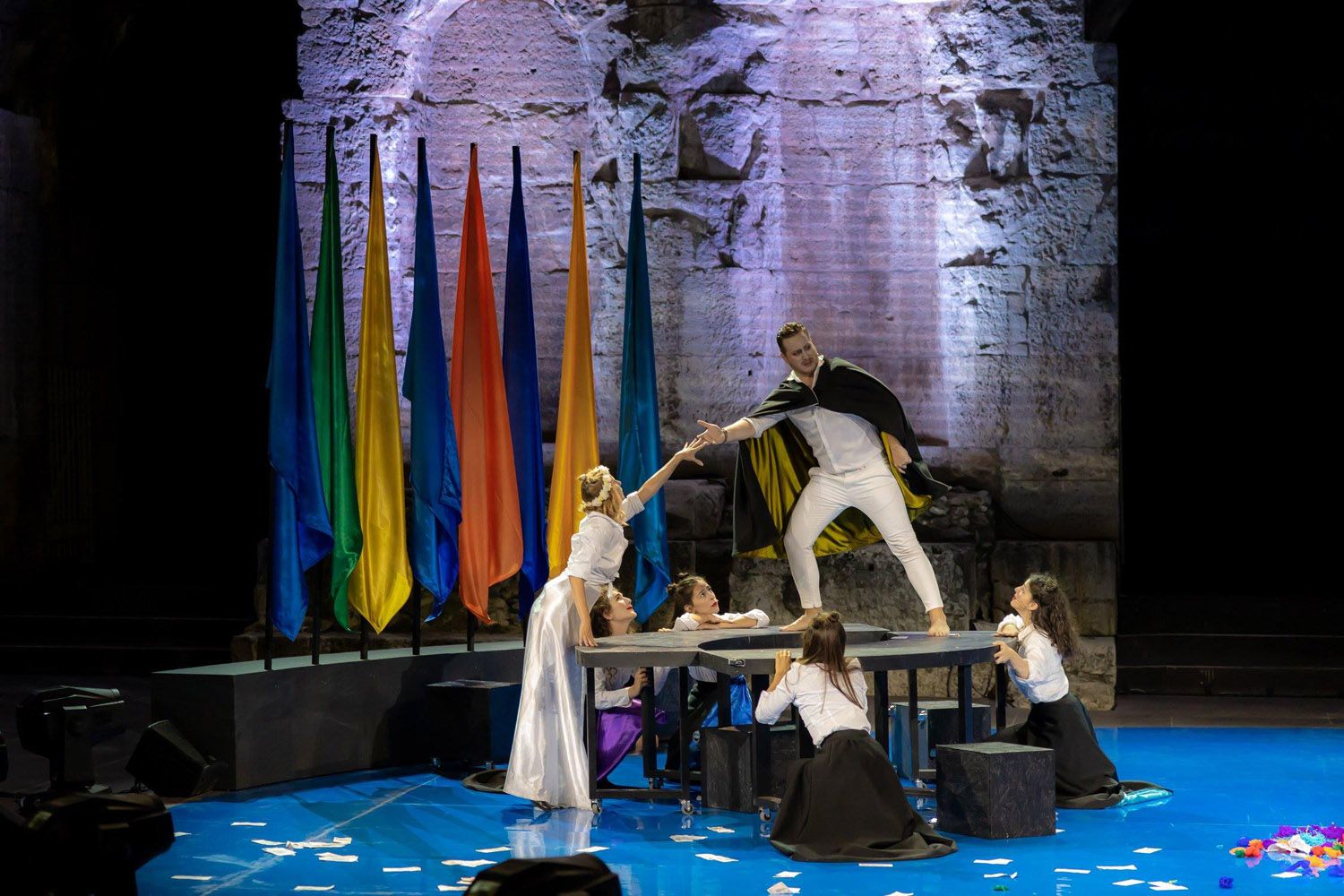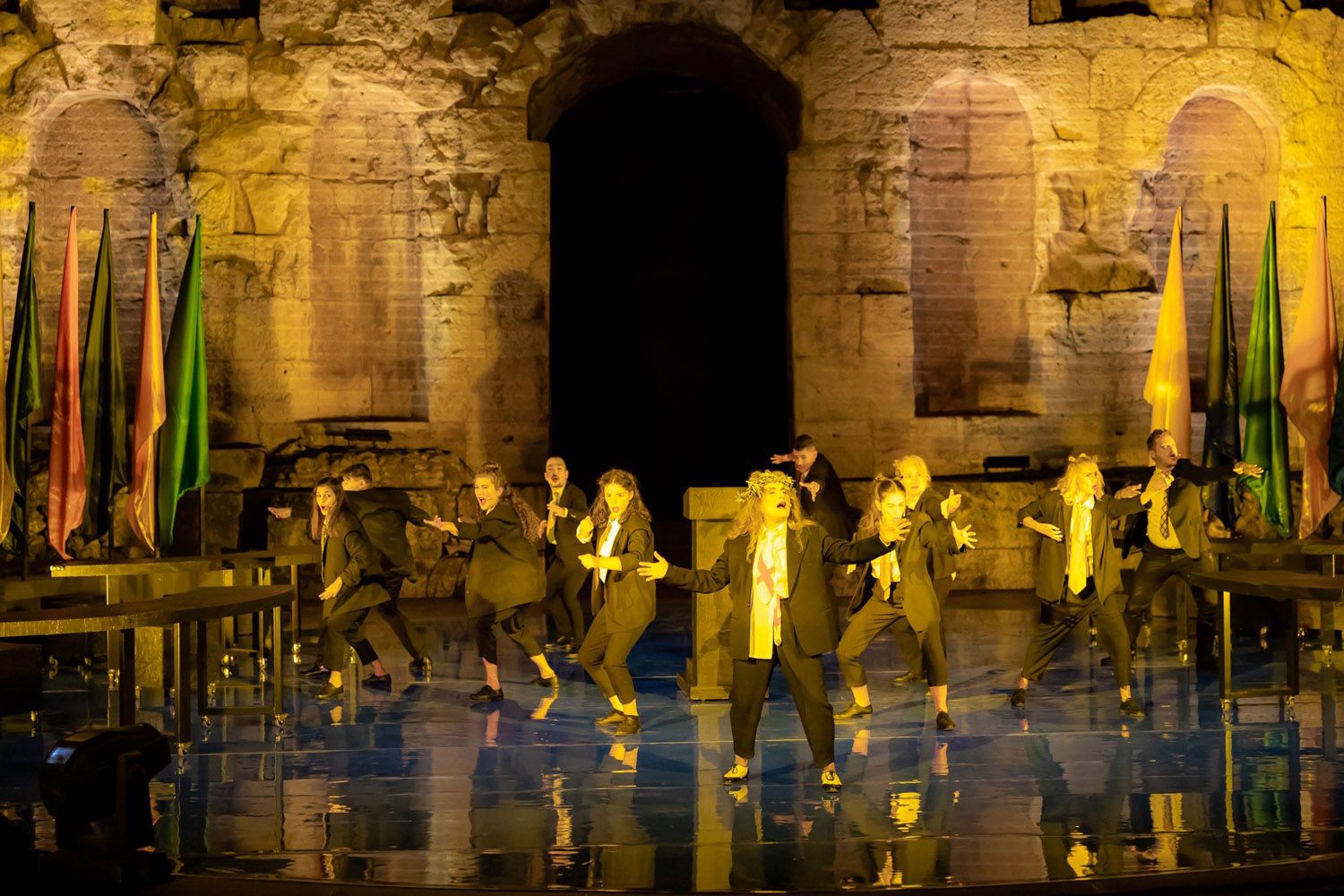ECCLESIAZUSAE by Aristophanes – The Operetta
- Friday, July 2Curium Ancient Theatre
- Saturday, July 3Curium Ancient Theatre
- Performances start at:21:00Please arrive at the theatre before 20:00
The Greek Art Theatre Karolos Koun and the Greek National Opera, present the extremely edgy and highly topical comedy of Aristophanes, Ecclesiazusae, in an original version of a contemporary, folk operetta in translation, libretto and music by Stamatis Kraounakis, directed by Marianna Calbari.
At a time of utter political and social decline, where corruption and inequality have exceeded all limits, women, at the initiative of Praxagora, decide to take radical action. Disguised as men, they manage to seize power and impose their political reforms, proposing a new regime where both property and sex are communal. However, Praxagora’s revolutionary plan, although ideal in theory, shall prove to be utopian in practice and will be undermined by successive tragicomic situations.
Music, highlights both the political and the deeply poetic aspect of this Aristophanic comedy: a dreamy, transcendental element that Aristophanes so intricately entangles with the madness of his comic universe.
WITH ENGLISH SURTITLES
- Translation-Libretto-Music:
Stamatis Kraounakis
- Direction:
Marianna Calbari
- Set/Costume design:
Christina Calbari
- Choreography:
Thodoris Panas
- Lighting design:
Stella Kaltsou
- Director’s assistant:
Marilena Moschou
- Set designer’s assistant:
Sophia Arvaniti-Florou
- Production assistant:
Dionisis Christopoulos
- Photography:
Stavros Habakis
Cast (in order of appearance):
- Praxagora:
Sophia Filippidou
- Chremes:
Christos Gerontidis
- Young man:
Sakis Karathanasis
- Herald:
Kostas Mpougiotis
- Man/Third old lady:
Giorgos Stivanakis
- Young girl/Woman herald:
Katerina Lipiridou
- Sostrati/First old lady:
Ioanna Mavrea
- Vlepyros/Second old lady:
Christophoros Stampoglis
Chrorus:
Tereza Kazitori,
Sakis Karathanasis,
Pina Kouloglou,
Katerina Lipiridou,
Ioanna Mavrea,
Kostas Mpougiotis,
Giorgos Stivanakis,
Matilda Toumpourou
- Musicians on stage:
Vaios Prapas (Guitar, bouzouki),
Giorgos Tamiolakis (Cello, euphonium),
Dimitris Andreadis (Keyboards) - Orchestration:
The composer, Stamatis Kraounakis, in collaboration with the band of musicians
Director’s note
How do we approach one of Aristophanes’ comedies today? How do we stage Ecclesiazusae, this brilliant, madcap, and at the same time, deeply melancholic political comedy today? I believe that whichever road we choose – and there are many – we must follow it “with our hearts”. This is the only condition Aristophanes seems to set.
For a long time Stamatis Kraounakis has had the play in his own heart. And then came the assignment by Giorgos Koumentalis and the Greek National Opera with which the Greek Art Theatre is embarking for the first time in its history on an extremely interesting collaboration. This is the 16th production of the comedy by the Greek Art Theatre and the second staging of Ecclesiazusae after the 2005 Epidaurus Festival, translated by Yiannis Varveris and directed by Diagoras Chronopoulos. This is, however, the first time Ecclesiazusae will be staged as an operetta, and indeed in the popular form of the genre. Why operetta?
To begin with, opera itself derives from the ancient drama. It was the theatrical genre that was created in the late 16thcentury by Florentine scholars who wanted to understand and revive the ancient Greek prosody, that is to say, the rhythm with which the words were spoken. Later on, a new type of opera appeared- in a shorter and simpler style and in a light and more comical character, part of which is in prose: the operetta. Therefore, if ancient comedy were to take on a musical form, that form could be none other than operetta. The term “popular” simply denotes our wish to createa production that will be loved by the audience in the same way that Aristophanes’ poetry is also “popular”.
With regard to the performance itself, let us leave theory aside. In any case, theatre is action above all. And a matterfor the heart….
“Hold fast, crazed heart, hold fast
though they may want you to beat your last.
Keep firm hold of the beauty of youth,
it will guide you through life’s great adventure”.
(Parabasis – «Song of homecoming», music-lyrics: Stamatis Karaounakis)Marianna Calbari
GREEK ART THEATRE KAROLOS KOUN
The Greek Art Theatre, was founded in 1942 by Karolos Koun and his students and has been active continuously since then producing rich artistic and educational work in both its scenes (Ypogeio – year of establishment 1954 and Frynichou – founded in 1985), as well as in his Drama School (founded 1942).In the modern era, the Greek Art Theatre Karolos Koun, presents a number of artistic productions and co-productions each year with private and sometimes public organizations and strives to maintain a common spirit, common line and ethos.
The philosophy that Koun inherited us: faith in an ensemble theater, the power of collectivity, the choice of important texts both classical and contemporary, the search for new ways and new forces of expression in art, the emergence of modern Greek playwright, the research, the connection of the theater with the society. At the same time, through a multitude of parallel actions, we seek to link the past with the present while at the same time paving the way for the future.
GREEK NATIONAL OPERA
The Greek National Opera (GNO) was founded in 1940, a few months before Italy declared war on Greece. The company had been preceded by a 150-year history of a flourishing opera tradition on the Ionian Islands and half a century of activity by the Hellenic Melodrama, an opera company which ran in various forms from 1888 to 1938. From the outset, the GNO repertory comprised operas, operettas and ballets. During the past decade, in response to current demands, the GNO has developed a Children’s Stage to develop future friends of opera. It also encourages modern works by commissioning new operas to contemporary composers. In this way the repertory of the GNO covers four centuries of opera from Monteverdi to contemporary Greek composers. The opera company operated initially as part of the National Theatre and gave performances in its historic neoclassical building on central Aghiou Constantinou Street, designed by the famous German architect Ernst Ziller.
In 1944 the company became a state-run corporation and was officially named Greek National Opera. Its first production in the old Olympia Theatre at Academias Street was Rhea, a significant opera by Greek composer Spyros Samaras. In 1946 the opera ensemble became an independent company, giving daily performances as of 1949 at the Metropolitan summer venue, and at the Kyveli Theatre during the rest of the season. In 1950 the government released a bill providing for the foundation of a ballet school within the GNO. In 1958 the newly-built Olympia Theatre was inaugurated with Verdi’s Aida.
Between 1959 and 1964 the repertory grew apace, with at least twenty productions every season. A total of almost thirty operas were introduced to the Greek audience for the first time. The company generously supported works by Greek composers, and summer productions were staged at the Herodes Atticus Odeon as well as at the Ancient Theatre of Epidaurus starring Maria Callas, who many years before had made her professional debut as Maria Kalogeropoulou with the GNO. The company’s steady artistic development was interrupted by the military coup of 21 April 1967.
In 1974, when democracy was reinstated, the Hellenic Ministry of Culture assumed responsibility for the company. The notorious ‘certificate of political affiliation’, which had been necessary for all staff both administrative and artistic since the company’s foundation, was abolished and the organization of the company became more democratic generally, while its repertory was expanded. In the years that followed, some of the most distinguished personalities of Greek music have been at the helm of the GNO, expanding and improving the company’s activities, particularly by introducing new works and promoting the company internationally. Gradually the GNO developed its co-production policy, so that nowadays it co-produces operas with some of the world’s leading opera houses. Since 1994, the GNO has been a private, state-funded organization.
In March 2017, the Greek National Opera relocated at its new premises at the Stavros Niarchos Foundation Cultural Center, which constitutes a donation of the Stavros Niarchos Foundation to the Greek state. GNO’s presents its artistic programme in its two venues at the SNFCC: the Stavros Niarchos Hall and the Alternative Stage. Every summer, the GNO presents summer productions at the open-air theater Odeon of Herodes Atticus.
